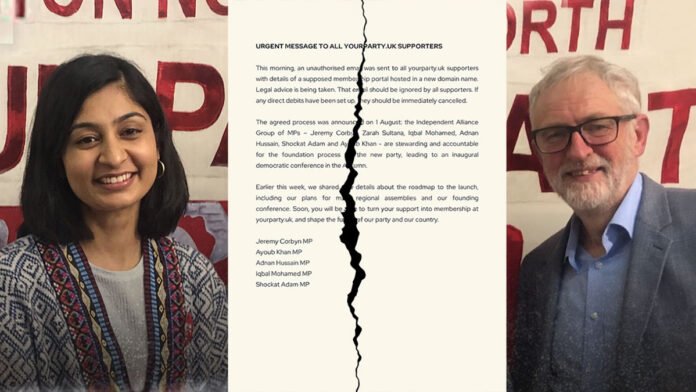Your Party in Chaos: Corbyn Tells 750k Supporters to “Ignore” Sultana’s Membership Email
The honeymoon is over. What began as a promising left-wing alliance between Jeremy Corbyn and Zarah Sultana has collapsed into public acrimony, with the co-founders of Your Party now openly warring over the basic mechanics of running their fledgling movement.
The latest crisis erupted this morning when Sultana unilaterally launched a membership portal for the as-yet-unnamed party, sending emails to all 750,000 supporters offering membership at £5 per month or £55 annually. Within hours, she was celebrating on social media: “10,000 have joined us as paid-up members! Some people have experienced issues due to such high traffic!”
By afternoon, that celebration had turned to recrimination. At 2:07pm, Corbyn posted an urgent warning to supporters: “This morning, an unauthorised email was sent to all Your Party supporters with details of a supposed membership portal hosted in a new domain name. Legal advice is being taken. That email should be ignored by all supporters.”
The speed with which triumph became disaster tells the story of a movement already eating itself. One insider confirmed that the disputed email “uses exactly the same email and payment systems and is linked to the same bank account as all previous Your Party communications,” but crucially, it was sent without Corbyn’s authorisation, or knowledge.
“A Sexist Boys’ Club”: Sultana Accuses Corbyn Faction of Freezing Her Out
Sultana’s response reveals the depth of the rift. In a defiant statement, she accused her co-founder and fellow MPs of creating “what can only be described as a sexist boys’ club,” claiming she had been “treated appallingly and excluded completely” from decision-making processes. Her “sole motivation,” she insisted, was to “safeguard the grassroots involvement that is essential to building this party.”
This public breakdown represents more than personality clashes; it exposes fundamental disagreements about power, process, and the very nature of left-wing politics. Sultana’s impatience with committee structures and her preference for grassroots mobilisation directly conflicts with Corbyn’s more cautious, consensus-building approach.
The irony is stark. A movement that promised to challenge Labour’s centralised control is fragmenting over questions of internal democracy. Sultana’s unilateral action, however well-intentioned, mirrors the top-down decision-making she claims to oppose. Her complaint about being excluded from “official accounts” while simultaneously launching unauthorised fundraising reveals the contradiction at the heart of their dispute.
The financial stakes are significant. Sultana claims her unauthorised portal attracted 20,000 paid members within hours, potentially generating over £1 million annually. That kind of money could fund a serious political operation, or become the source of legal battles that destroy the movement before it begins.
This crisis was perhaps inevitable. The partnership was shaky from its July launch, when Sultana announced the new party before Corbyn was ready, leaving him scrambling to catch up with his own co-founder’s timeline. Their relationship deteriorated further when Sultana criticized Corbyn’s handling of antisemitism allegations during his Labour leadership, accusing him of “capitulating” to the IHRA definition.
Corbyn’s measured response, calling the criticism “not really necessary”, revealed a man uncomfortable with public conflict even within his own movement. Sultana’s combative approach suggests she learned different lessons from Labour’s internal wars.
This combative instinct has already cost Sultana significant support within her own movement. Her rigid declaration that there is “no room for socially conservative views in a socialist left-wing party” and her absolutist stance on transgender issues alienated substantial numbers of women and feminist activists who might otherwise have embraced a working-class political alternative.

Many of these women, and male supporters, lifelong socialists who have fought for decades to secure sex-based rights, suddenly found themselves characterised as bigots and told to “join the Conservative Party” for holding views that were mainstream feminist positions just years earlier.
By prioritising ideological purity over coalition-building, Sultana transformed what should have been an inclusive working-class movement into an exclusive club with rigid membership criteria.
The irony is profound: a politician who claims to champion grassroots democracy simultaneously excludes large sections of the grassroots based on their failure to conform to her particular interpretation of progressive orthodoxy. This approach not only fragments the left but hands ammunition to opponents who can point to a movement that preaches inclusion while practising exclusion.
Corbyn vs. Sultana: The Grassroots vs. Consensus Battle Tearing Your Party Apart
The broader left will be watching this implosion with familiar despair. Once again, progressive forces seem more capable of fighting each other than their supposed enemies. The spectacle of two socialist politicians conducting warfare through press releases and social media posts provides ammunition for those who argue the left lacks the discipline necessary for serious politics.
For supporters who donated or signed up during this morning’s chaos, the message is confusion. Corbyn urges them to cancel direct debits while Sultana insists the portal is “safe and secure.” The movement that promised clarity in opposition to Labour’s triangulation now offers only competing narratives and legal threats.
The question facing Your Party, if it survives, is whether this represents growing pains or terminal illness. Sultana’s grassroots instincts aren’t wrong, but her methods have alienated the very allies she needs to make them work. Corbyn’s caution may preserve unity, but risks suffocating the energy that drew people to the project.
What began as an alternative to Labour’s managed decline now resembles its own miniature version of the same dysfunction. The mill isn’t just experiencing trouble, it’s grinding to a halt while its operators argue over who has the right to turn the wheel.
Whether this movement can recover from such public disarray remains an open question. But for a left that has spent years lamenting its divisions, watching Corbyn and Sultana conduct their civil war in full view of their enemies provides a dispiriting reminder that some patterns prove stubbornly difficult to break.

When the country desperately needs genuine left-wing opposition capable of working with trade unions, environmental groups, and community organisations to challenge a failing system, we get instead this depressing spectacle: the Ouroboros of progressive politics, a movement so busy consuming itself that it forgets its supposed purpose.
The sight of Corbyn and Sultana conducting their civil war through press releases while working-class communities face energy poverty, housing crises, and collapsing public services represents everything wrong with contemporary left-wing politics. Perhaps the lesson is brutally simple: when you abandon the material foundations of class struggle for the quicksand of cultural orthodoxy, when you prioritise ideological purity over broad-based coalition building, when you demand conformity on issues that divide your natural supporters, you don’t build a movement, you build a sect.
The tragedy is that Britain’s establishment has never been more vulnerable, its contradictions never more apparent, yet the left’s response is to fragment over questions of process and identity rather than unite around the economic injustices that affect everyone. Maybe returning to class politics, boring, unfashionable, but undeniably real, would offer a better foundation than this endless cycle of self-sabotage.
Support Independent Journalism Today
Our unwavering dedication is to provide you with unbiased news, diverse perspectives, and insightful opinions. We're on a mission to ensure that those in positions of power are held accountable for their actions, but we can't do it alone. Labour Heartlands is primarily funded by me, Paul Knaggs, and by the generous contributions of readers like you. Your donations keep us going and help us uphold the principles of independent journalism. Join us in our quest for truth, transparency, and accountability – donate today and be a part of our mission!
Like everyone else, we're facing challenges, and we need your help to stay online and continue providing crucial journalism. Every contribution, no matter how small, goes a long way in helping us thrive. By becoming one of our donors, you become a vital part of our mission to uncover the truth and uphold the values of democracy.
While we maintain our independence from political affiliations, we stand united against corruption, injustice, and the erosion of free speech, truth, and democracy. We believe in the power of accurate information in a democracy, and we consider facts non-negotiable.
Your support, no matter the amount, can make a significant impact. Together, we can make a difference and continue our journey toward a more informed and just society.
Thank you for supporting Labour Heartlands









